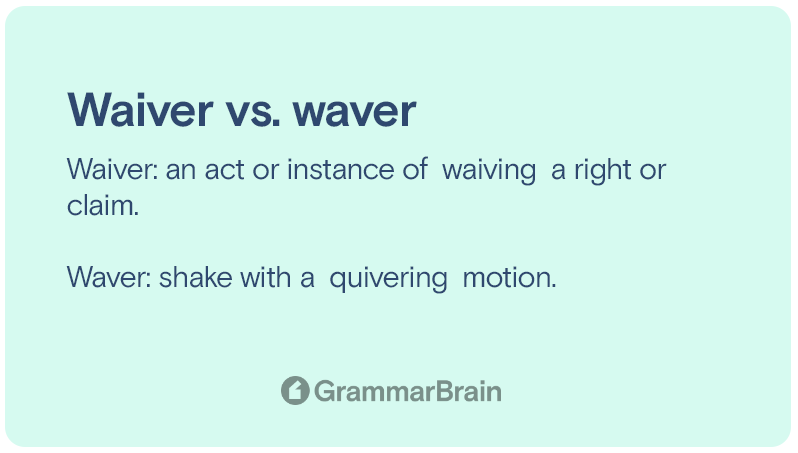Homophones are words that sound alike, though they hold different meanings. You’ve got to love those sneaky words that sound the same. “Waver” and “waiver” sound alike. Although they hold very different meanings. Knowing the difference and when to use each will help you improve your writing.
Difference between waiver and waver
Waiver
If you add an “er” to the end of the word “waive,” you get a noun that can mean more than one thing. Giving up a privilege or right is one way to use the word “waiver.” It can also mean a piece of paper that proves the handover or an exemption from a law, rule, or penalty.
In pro sports, the word “waive” means something else. When a player on a team’s roster is put on the waiver, other teams can claim him. He is no longer on the team’s roster if no team claims him.

Waver
To “waver” is to “sway back and forth, unsure of one’s path, or to falter or become unstable.” The word signifies this when the article “I” is removed. The term “waver” may also be used to describe the shaking quality of a sound.
Even when she hit the highest notes, a singer’s voice didn’t waver, but a man’s determination wavered after being questioned for hours.
When you’re in the middle of a significant paper or report, these words are pretty tricky than they look at first.
| Word | Definition |
| Waiver (noun) | an act or instance of waiving a right or claim. |
| Waver (verb) | shake with a quivering motion. |
Examples of use (waiver vs. waver)
Waver examples
- When a strong gust of wind blew, the candle flame wavered.
- The birthday girl blew out her candle, causing the flame on top of the cake to waver.
- In the Harry Potter movie, at first, Harry’s broom wavered. But he soon learned to use it remarkably well by relying on his innate magical ability.
Waiver examples
- Students must sign a waiver before taking part in the field trip.
- The doctors required that Michaela sign an insurance waiver before surgery.
- When we go on a school trip, our parents sign a waiver stating that the school will not be held to blame if anything happens to us.
How one word became the same as the other
In the 19th century, “waver” and “waiver,” which come from the words “wave” and “waive,” came to mean the same thing. People used them to say, “Ignore or throw away.” There’s no doubt that the words “waver and waiver” started to sound alike.
Based on what you know, what do you think? Some people say that the word “wave” (or “waver”) means “a sign of refusal” and “dismissal” at the same time. Can the words “waive” and “waver” be used interchangeably? Let’s think deeply about it for a minute!
How you use these words in a sentence is very important. Remember that a waiver is a legal term used quite often in the modern world (more on that later). “Waver” can describe a loose movement back and forth or a state of hesitating, among other things. What you say depends on what you want to say.
Let’s clear up the confusion about “Waiver vs. Waiver.”
You should now be able to tell the difference between “waiver” and “waver.” “Waiver” and “waver” may seem the same, but they are spelled and mean different things.
For instance, did you ask for a “waiver” or “waver” of your visa? You should know what the difference is. If you have been paying attention, you can agree that it is a “waiver” of the need for a visa.
Again, how formal is the phrase “waver and waiver”? It’s true that “waive” is a formal word. The word is usually used formally if a document is meant.
“Waver” can be used anywhere and still sound casual. A lot of people like to use it in casual situations and conversations.
Conclusion
“Waver” and “waiver” are the same but have different spellings. “Waiver” is a word used in legal situations or other situations where you have to give up or give up on something. “Waver” can be used in many situations where there is doubt or hesitation about doing something.
You’re a grammar pro if you know how to use different words, especially ones that sound the same. The detailed information and examples above about “waver vs. waiver” will help you make the right choice when you need to use either or both of these words.
Inside this article
Fact checked:
Content is rigorously reviewed by a team of qualified and experienced fact checkers. Fact checkers review articles for factual accuracy, relevance, and timeliness. Learn more.
Core lessons
Glossary
- Abstract Noun
- Accusative Case
- Anecdote
- Antonym
- Active Sentence
- Adverb
- Adjective
- Allegory
- Alliteration
- Adjective Clause
- Adjective Phrase
- Ampersand
- Anastrophe
- Adverbial Clause
- Appositive Phrase
- Clause
- Compound Adjective
- Complex Sentence
- Compound Words
- Compound Predicate
- Common Noun
- Comparative Adjective
- Comparative and Superlative
- Compound Noun
- Compound Subject
- Compound Sentence
- Copular Verb
- Collective Noun
- Colloquialism
- Conciseness
- Consonance
- Conditional
- Concrete Noun
- Conjunction
- Conjugation
- Conditional Sentence
- Comma Splice
- Correlative Conjunction
- Coordinating Conjunction
- Coordinate Adjective
- Cumulative Adjective
- Dative Case
- Determiner
- Declarative Sentence
- Declarative Statement
- Direct Object Pronoun
- Direct Object
- Diction
- Diphthong
- Dangling Modifier
- Demonstrative Pronoun
- Demonstrative Adjective
- Direct Characterization
- Definite Article
- Doublespeak
- False Dilemma Fallacy
- Future Perfect Progressive
- Future Simple
- Future Perfect Continuous
- Future Perfect
- First Conditional
- Irregular Adjective
- Irregular Verb
- Imperative Sentence
- Indefinite Article
- Intransitive Verb
- Introductory Phrase
- Indefinite Pronoun
- Indirect Characterization
- Interrogative Sentence
- Intensive Pronoun
- Inanimate Object
- Indefinite Tense
- Infinitive Phrase
- Interjection
- Intensifier
- Infinitive
- Indicative Mood
- Participle
- Parallelism
- Prepositional Phrase
- Past Simple Tense
- Past Continuous Tense
- Past Perfect Tense
- Past Progressive Tense
- Present Simple Tense
- Present Perfect Tense
- Personal Pronoun
- Personification
- Persuasive Writing
- Parallel Structure
- Phrasal Verb
- Predicate Adjective
- Predicate Nominative
- Phonetic Language
- Plural Noun
- Punctuation
- Punctuation Marks
- Preposition
- Preposition of Place
- Parts of Speech
- Possessive Adjective
- Possessive Determiner
- Possessive Case
- Possessive Noun
- Proper Adjective
- Proper Noun
- Present Participle
- Prefix
- Predicate



